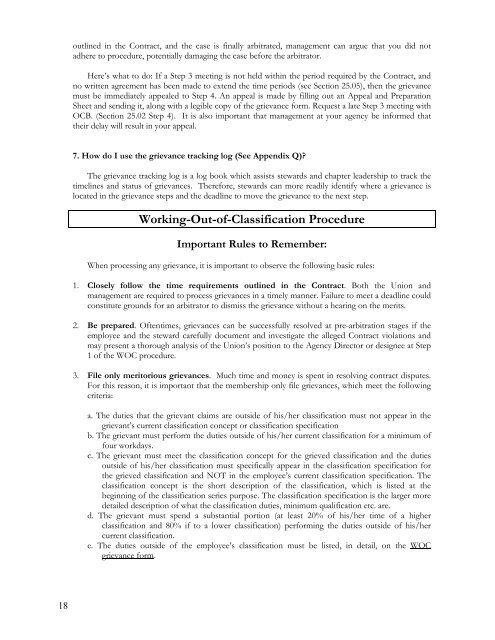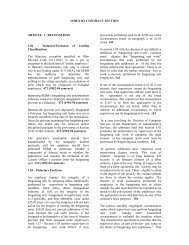Download the Grievance Guide - OCSEA
Download the Grievance Guide - OCSEA
Download the Grievance Guide - OCSEA
Create successful ePaper yourself
Turn your PDF publications into a flip-book with our unique Google optimized e-Paper software.
outlined in <strong>the</strong> Contract, and <strong>the</strong> case is finally arbitrated, management can argue that you did not<br />
adhere to procedure, potentially damaging <strong>the</strong> case before <strong>the</strong> arbitrator.<br />
Here’s what to do: If a Step 3 meeting is not held within <strong>the</strong> period required by <strong>the</strong> Contract, and<br />
no written agreement has been made to extend <strong>the</strong> time periods (see Section 25.05), <strong>the</strong>n <strong>the</strong> grievance<br />
must be immediately appealed to Step 4. An appeal is made by filling out an Appeal and Preparation<br />
Sheet and sending it, along with a legible copy of <strong>the</strong> grievance form. Request a late Step 3 meeting with<br />
OCB. (Section 25.02 Step 4). It is also important that management at your agency be informed that<br />
<strong>the</strong>ir delay will result in your appeal.<br />
7. How do I use <strong>the</strong> grievance tracking log (See Appendix Q)?<br />
The grievance tracking log is a log book which assists stewards and chapter leadership to track <strong>the</strong><br />
timelines and status of grievances. Therefore, stewards can more readily identify where a grievance is<br />
located in <strong>the</strong> grievance steps and <strong>the</strong> deadline to move <strong>the</strong> grievance to <strong>the</strong> next step.<br />
Working-Out-of-Classification Procedure<br />
Important Rules to Remember:<br />
When processing any grievance, it is important to observe <strong>the</strong> following basic rules:<br />
1. Closely follow <strong>the</strong> time requirements outlined in <strong>the</strong> Contract. Both <strong>the</strong> Union and<br />
management are required to process grievances in a timely manner. Failure to meet a deadline could<br />
constitute grounds for an arbitrator to dismiss <strong>the</strong> grievance without a hearing on <strong>the</strong> merits.<br />
2. Be prepared. Oftentimes, grievances can be successfully resolved at pre-arbitration stages if <strong>the</strong><br />
employee and <strong>the</strong> steward carefully document and investigate <strong>the</strong> alleged Contract violations and<br />
may present a thorough analysis of <strong>the</strong> Union’s position to <strong>the</strong> Agency Director or designee at Step<br />
1 of <strong>the</strong> WOC procedure.<br />
3. File only meritorious grievances. Much time and money is spent in resolving contract disputes.<br />
For this reason, it is important that <strong>the</strong> membership only file grievances, which meet <strong>the</strong> following<br />
criteria:<br />
a. The duties that <strong>the</strong> grievant claims are outside of his/her classification must not appear in <strong>the</strong><br />
grievant’s current classification concept or classification specification<br />
b. The grievant must perform <strong>the</strong> duties outside of his/her current classification for a minimum of<br />
four workdays.<br />
c. The grievant must meet <strong>the</strong> classification concept for <strong>the</strong> grieved classification and <strong>the</strong> duties<br />
outside of his/her classification must specifically appear in <strong>the</strong> classification specification for<br />
<strong>the</strong> grieved classification and NOT in <strong>the</strong> employee’s current classification specification. The<br />
classification concept is <strong>the</strong> short description of <strong>the</strong> classification, which is listed at <strong>the</strong><br />
beginning of <strong>the</strong> classification series purpose. The classification specification is <strong>the</strong> larger more<br />
detailed description of what <strong>the</strong> classification duties, minimum qualification etc. are.<br />
d. The grievant must spend a substantial portion (at least 20% of his/her time of a higher<br />
classification and 80% if to a lower classification) performing <strong>the</strong> duties outside of his/her<br />
current classification.<br />
e. The duties outside of <strong>the</strong> employee’s classification must be listed, in detail, on <strong>the</strong> WOC<br />
grievance form.<br />
18

















